Grow Plants with LED Lights – African Violet Plant Stand
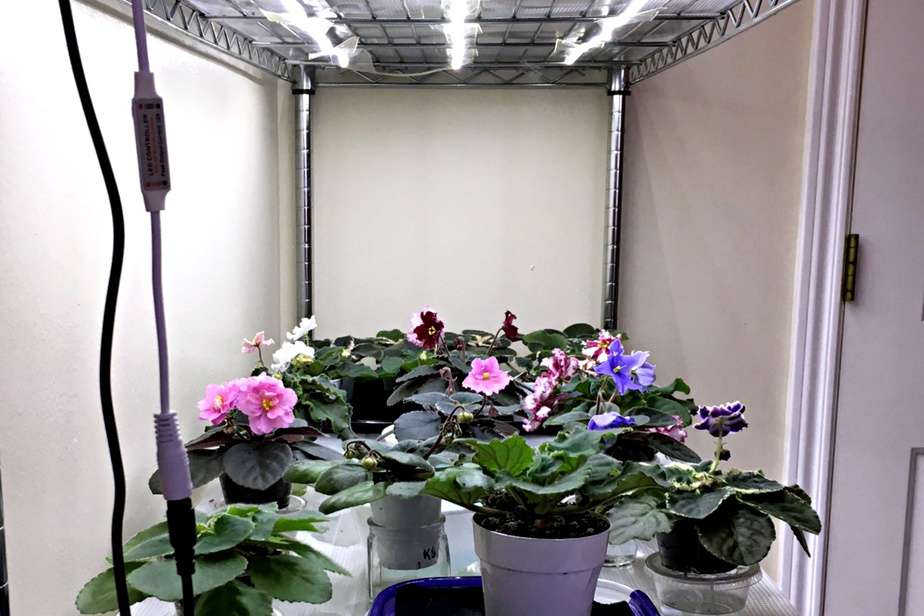
More and more growers are saying goodbye to their fluorescent lights in exchange for the convenience of LED’s. LED lights use less electricity, last longer, and are more cost-effective. They also use substantially less heat making them safer, and I’ve noticed I don’t get water spots on leaves. Here I will show you the results of lots of trial and error to show you how to grow plants with LED lights. (Click here to see how to convert any open shelf into a DIY Grow Light Stand for Houseplants.)
Can you use regular led lights for grow lights? The traditional form of artificial lighting for African violets and other house plants are fluorescent bulb lights. Time and time again I’ve seen growers successfully grow plants without the use of specific grow light bulbs, but traditional fluorescent lights like you would buy at a big box store. Many growers prefer one cool bulb and one warm but other show growers have said they don’t think the color (Kelvin) affects plant growth a substantial amount. Therefore, one can assume that LED’s for plants don’t have to be “led grow lights” but can be traditional led lights. Also, using mainstream led lights is a much more economical option considering the high price of led grow light bulbs.
Best Light for Growing Plants Indoors
Quick Links to Information in this Post
- 1 Best Light for Growing Plants Indoors
- 2 My Lighting Setup – LED Grow Lights for Indoor Plants
- 3 What Kind of LED Lights Grow Plants?
- 4 The Set-Up: How To Grow African Violets with LED Lighting
- 5 Attaching the Lights to Your Shelves
- 6 How To Turn Any Bookshelf Into A Lighted Plant Stand
- 7 Blessings,
- 8 You can follow Renovated Faith Below!
- 9
What I like most about this setup is that my LED’s are dimmable. This allows you to customize the amount of light for each shelf depending on their specific needs.
The dimmers also allow the lights to be closer to the plants. When I used fluorescent lighting on the same stand, I could only fit three shelves of plants as the plants had to be further away from the bulbs. But now with my dimmable lights, they require less distance between shelves, which freed up room to add another whole shelf, which meant more plants coming in the mail!
Led lights are also very gentle on plants as they don’t get as hot as fluorescent bulbs. I know of a successful hybridizer that uses led grow lights for seedlings so they are not subjected to the harsh heat of fluorescents. Starting seeds under led lights is not the only benefit.
Another distinct advantage of LED lights is that they produce significantly less heat and are therefore safer for in-home use.
LED lights are more expensive than fluorescent lights initially but in the long-term they are much cheaper as the LED’s don’t require regular bulb replacement. With fluorescent lighting, you have to replace the bulbs every 6 months to one year even if they don’t burn out because the light strength dims over time as the bulb ages.
I’ve used the same LED light tape for over 2 years and my plants all seem very happy. All ages of plants are thriving and I’ll never go back to fluorescents.
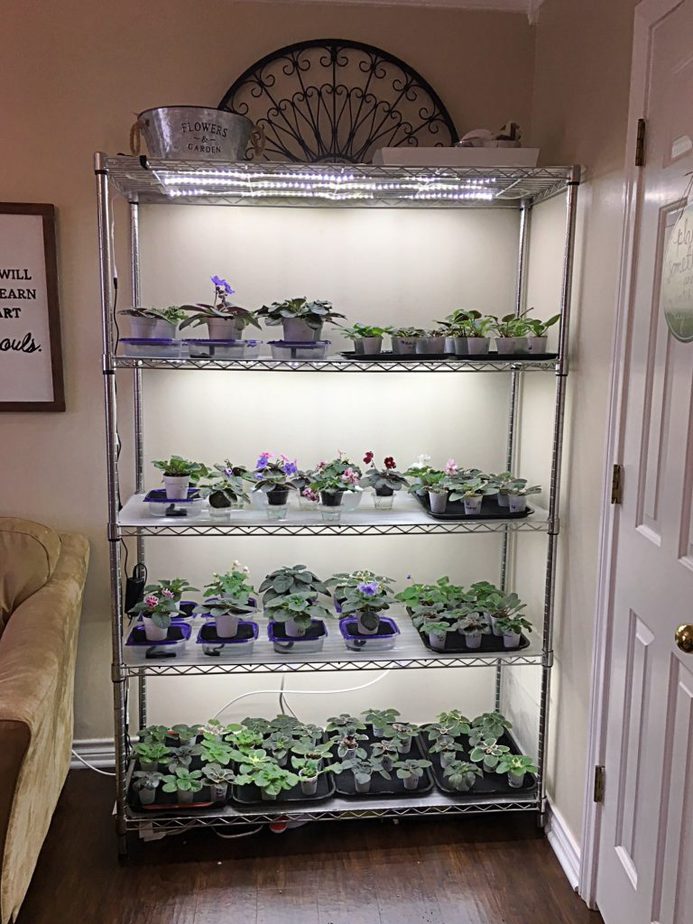
My Lighting Setup – LED Grow Lights for Indoor Plants
What You Need:
Some affiliate links are used in this post for your convenience. See my full disclosure HERE.
Plant Stand – Click HERE for wire shelf options
LED Light Tape with Included Dimmer – Click HERE for my lighting.
LED Dimmer (If you need extras) – Click HERE.
Power Supply (If you need extras) – Click HERE
Clear Gorilla Tape – Click HERE.
Clear Shelf Liner – Click HERE.
LED Connectors – Click HERE
Soldering Iron (optional)- Click HERE.
Solder (optional)- Click HERE.
Wire – Click HERE.
Zip Ties (optional for holding wires in place) – Click HERE.
Light Meter (optional) – Click HERE – There are also iPhone apps that you can use as a light meter.
Here is a plant stand filled with younger plants. I have four, lighted shelves per stand each at varying light strengths. (I measure the light for each shelf with a light meter and each measurement is taken 6 inches below the light tape). My lights are on for 9-10 hours a day.
Shelf 1 (top) 260 fc (foot-candles)
Shelf 2 330 fc
Shelf 3 260 fc
Shelf 4 330 fc
This gives me a lot of flexibility to tailor the light needs of various plants. For example, I have several Russian and Ukrainian hybrids, which prefer cooler temperatures. As the floor is always the coolest part of any room, I put them on the bottom two shelves. Also, plants that need more variegation go to the bottom shelf. Lots of my Buckeyes and Cajun’s are on the second (330 fc) shelf as they need more light.
If the crown of a plant on one of my 330 fc shelves looks tight, I move it to the end of that same shelf or to a 260 fc shelf. If a plant on the 260 fc shelf is reaching up, I send it to the middle of it’s current shelf or to a 330 fc shelf. This gives me a lot of options to ensure plants are getting the correct amount of light.
What color lights do plants grow best in? The LED light tape I use is 6000K which is pretty cool in terms of color. I haven’t seen any negative effects and there is also warmer light tape if you want to alternate between cool and warm. You’ll notice the clear gorilla tape I’m using to attach my lights has a slightly yellow tinge which probably blocks some of the blue rays which probably isn’t a bad thing. Using led lights for growing plants, you can customized the light color because light tape comes in different colors. You can check out a grow light spectrum chart HERE.
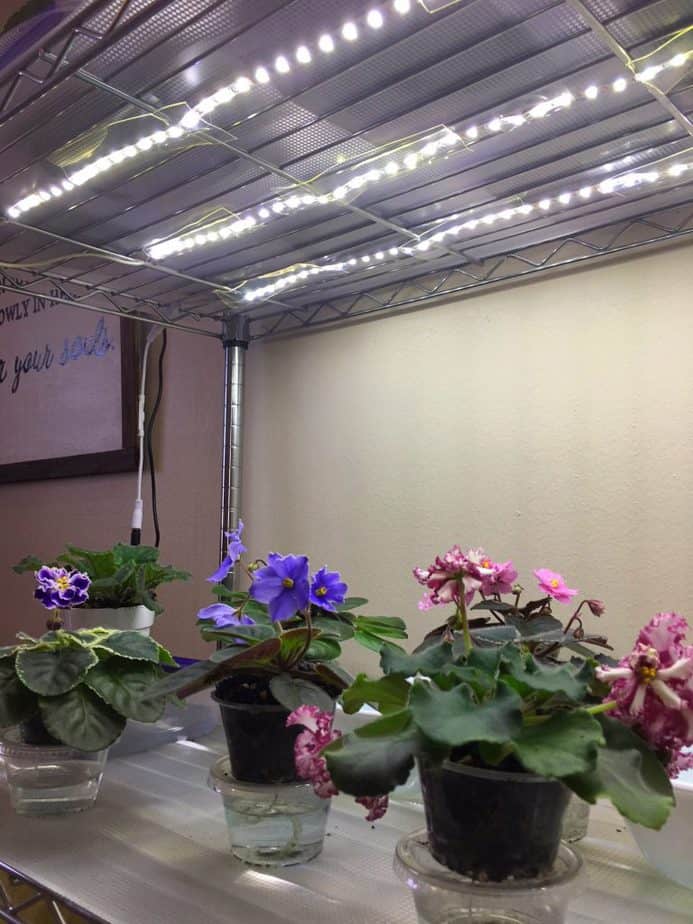
What Kind of LED Lights Grow Plants?
I use LED light tape which is sold on a long roll with an adhesive backing. On the tape, there are marks every couple inches where you can cut the tape to customize the length for your shelf.
I cut the light strips to my desired length and planned for three strands of light per shelf about 4 inches apart. My dad taught me how to solder and I used old stereo wire to connect the strands at each end. (There are several YouTube videos like THIS one that show you how to solder – I promise, it’s easy!) IF YOU DON’T WANT TO SOLDER, YOU CAN GET THESE CONNECTORS.
The Set-Up: How To Grow African Violets with LED Lighting
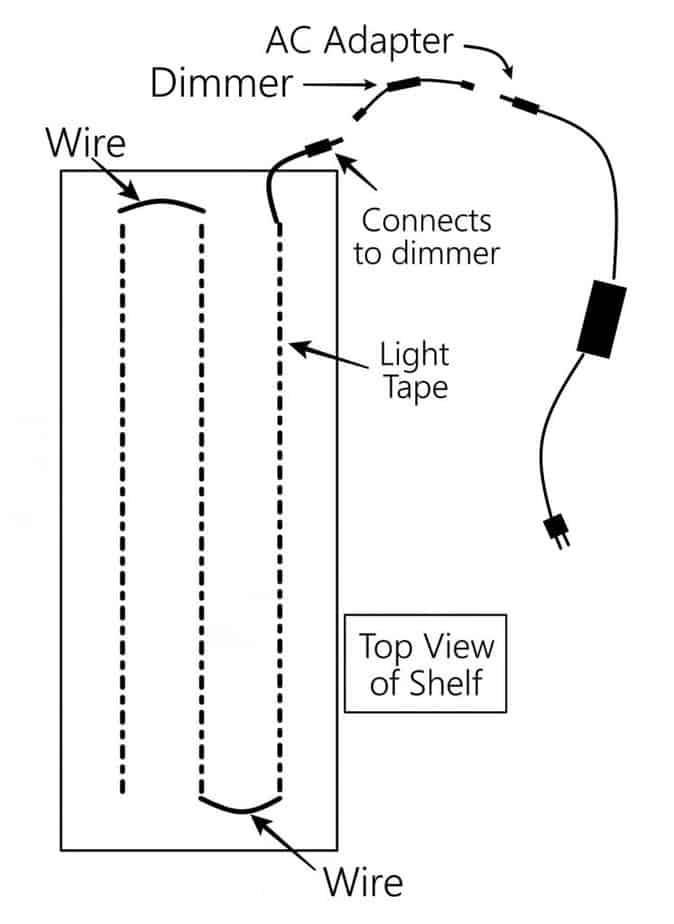
The end of each roll of light tape has an adapter which I connected to a dimmer. The dimmer comes with its own remote control to change the light level. The end of that dimmer cable then connects to an AC adapter, much like the power cord to your laptop.
Each shelf has its own dimmer and power adapter. From there I put all 4 plugs into a power strip and connected that to my digital wall timer. You could have a couple different timers if you wanted to change the lighting duration for one shelf of show plants as you ramp up for a show.
Attaching the Lights to Your Shelves
On each of my shelves, I have transparent non-adhesive shelf liner. I simply taped the light tape to the underside of the shelf liner and between the wires with clear gorilla tape every 6 inches. They need a flat surface to adhere to. (The adhesive on the back of the lights is not very strong, which is why I used additional tape). Another option is to get 2-inch plastic window blind slats and cut them to your shelf length. Then, tape the lights to the slats and then use cable ties to attach the slats to the underside of each shelf.
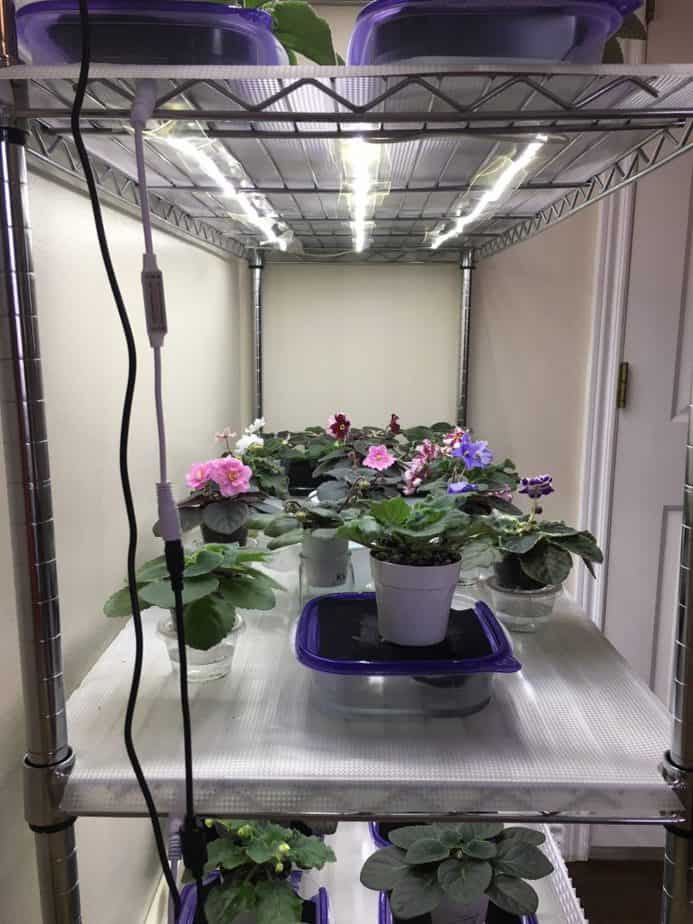
I wanted my lights to be completely flush to the bottom of the shelves because I like the fact that you can’t see the lights sticking out.
How Long to Keep Grow Lights on Plants
My lights are on a timer and are set to 10 hours a day. This varies with your conditions and of course the light strength and distance from your plants. Experiment with your plants to see how they react to different light strengths but do not put the lights on full-strengths. The dimmers are required to adjust the light because full-strength is too high for African violets. The tops of my plants are 10 inches from the lights.
There’s only one negative I have found to horticultural led grow lights with a dimmer. Each dimmer has a separate remote that comes with it, but each remote affects all the dimmers equally. So, if I push the “On” button on one remote, not just one strand goes on, they all do. This can be a pain when I want to adjust the light intensity of one shelf. However, I just unplug the others first, adjust the light of the one shelf and re-plug the others in. Fortunately, I change my settings very seldomnly so this is not really a big issue.
The cost to light my 4-shelf plant stand was just under $70 which included 4 power adapters, 4 dimmers and 2 spools of light tape.
No matter the type of plant, led light strips are a fabulous options for growing indoors.
I’d be happy to answer any questions you may have (Karin.m.peters@gmail.com). The exact details to the lights, dimmers, power cords, tape and shelf liner found can be found under African violet supplies HERE.
How To Turn Any Bookshelf Into A Lighted Plant Stand
I have made an updated version of my LED plant stand that can be adapted to any open shelf : Easy DIY Grow Light Stand
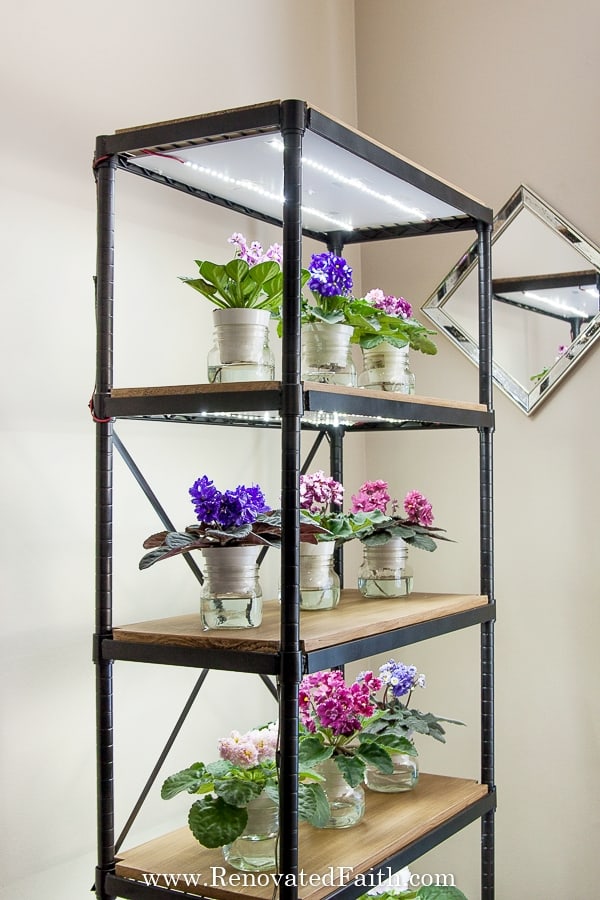
To save this post for later, pin it here:
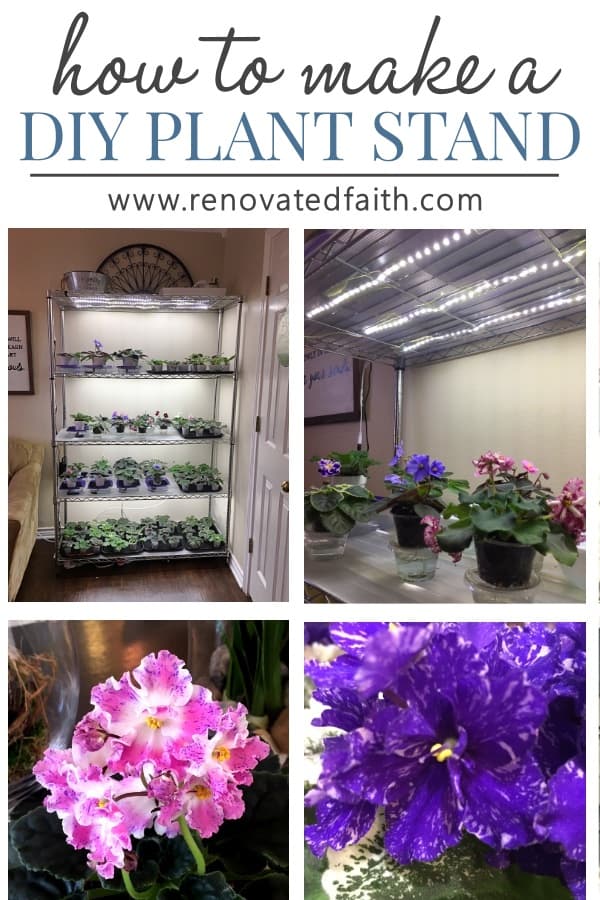
If you have any questions, feel free to contact me at karin@renovatedfaith.com.
Blessings,

You can follow Renovated Faith Below!
Email Subscription to Renovated Faith | Instagram | Pinterest | Facebook | Twitter
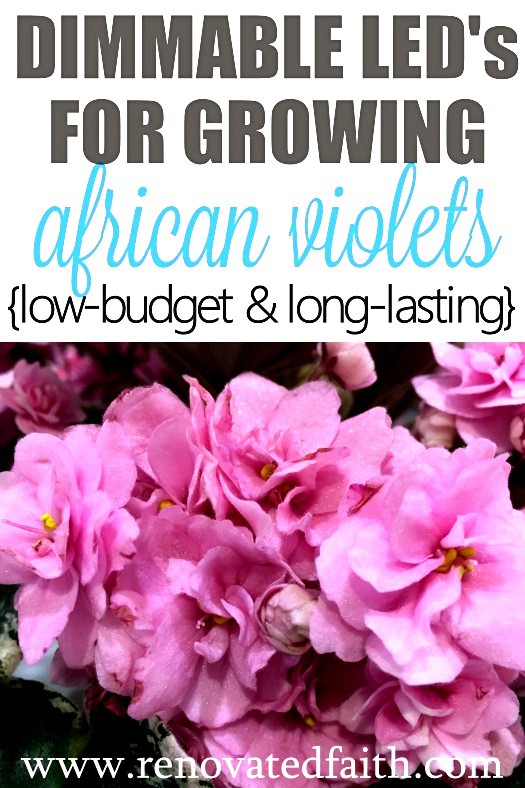
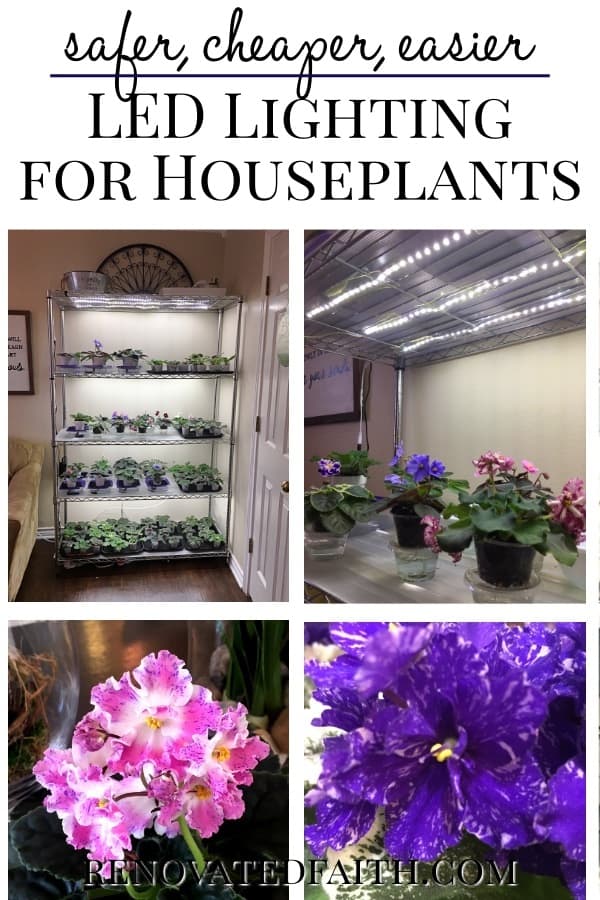
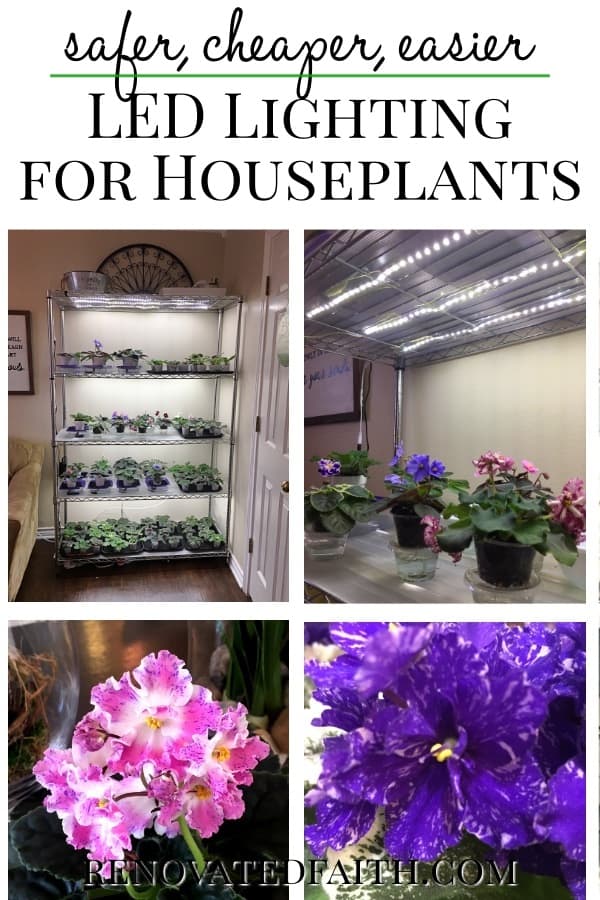
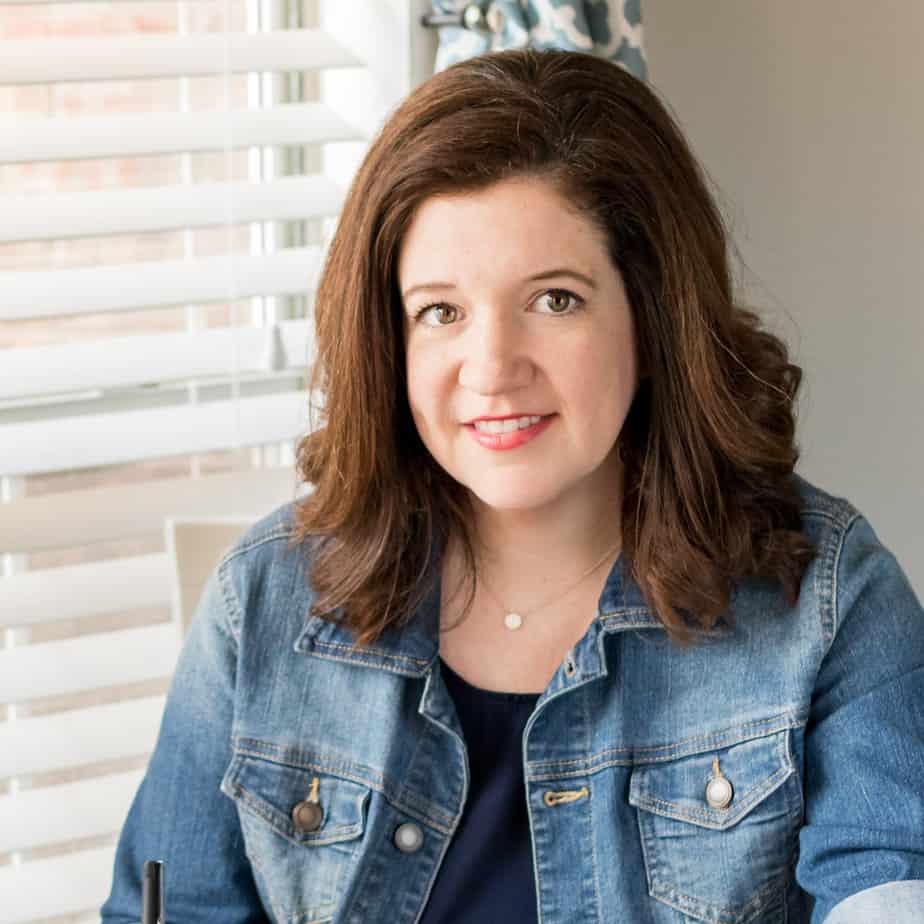
Karin Peters is a DIY expert and the creator of Renovated Faith. She is a furniture painter, a home design consultant, and a tenacious problem solver determined to help you transform your house into a home. With 17 years of experience with DIY home improvement, she researches and analyses professional processes to adapt them to be easy and cost-effective for DIYers. She then tests every project and product before it appears on the site in a detailed, step-by-step format. After attending Texas A&M University, she received her Master of Divinity with Biblical Languages at Southwestern Baptist Theology Seminary. Her passions unite in Renovated Faith, which shows readers how to create a home that serves them so they can pursue their God-given purposes. About Renovated Faith | Editorial Policy | Facebook | Twitter | LinkedIn

How wide is the stand pictured. Just trying to figure out how many strips to put in different width plant stands. I clicked on your link and it took me to several but they are all about 36″ long by 14″ wide.
Look forward to making some.
Thanks,
Steve
Hey Steve, the stand is 18″ deep and 48” long. Hops this helps!
I think they really do mean footcandles, but not of artificial light. Natural light is not nearly as constant as LED or compact fluorescent and the excellent light of an East window won’t be much good by lunchtime. Under lights we trade intensity for duration and run lights 8, 10, or even 12 hours per day.
Karin,
According to the African Violet Society, African violets need 900 – 1100 foot candle lighting. I see that are growing yours under LED lighting under only 200 – 300 foot candles. I am confused, how can that work?
Thanks,
Sheila
I saw that and stand by their website but don’t know how they got that either. Maybe they meant lumens. Let me know if I can answer any other questions Sheila!
This shelf is amazing. I love the look of the jars as wick pots! What size jars and pots are those? And what do you use for wick material? Thanks!
Hey Marilyn, Thank you SO much! I believe the pots are 3.5″. I bought the pots first and then took one to a couple of stores to find stores that would fit. I settled on some Ball jars at Walmart. Also, I just use acrylic yard for wicking. I highly suggested Hunter’s Hybrids wicking mix on FB. Let me know if you have any other questions at all! Blessings, Karin
I just purchased a 6 shelf wire stand. What is the height I should have the shelving measuring from the lights to the crown of an African violet, and is there one way to figure this out regardless if the plant is a mini or a standard. I am wanting to put my stand together and I do not want to readjust the shelves.
Also, I found you on AVSA, and I am very impressed with you stands for plants.
Cheryl
Hey Cheryl, Mine are about 8 inches from the center of the plant to the light. It can be any distance because the lights are dimmable. Let me know if you have any other questions Cheryl. Blessings, Karin
I noticed you are using a wicking method to water your violets. May I ask a few questions about that? When you are wicking does the top of the soil stay damp to the touch? I’ve recently purchased some wicking pots from the violet barn and I made my own potting mix from about 45% violet soil and 55% perlite. If I leave the wicks in the water at all times the tops of the pots stay damp to the touch. I did not know if this was normal or not. Please give me your thoughts/feedback on this if you don’t mind.
Debbie
Hey Debbie,
That sounds like a good mixture of soil to perlite. You want the top of the plants to be damp, not soaked. You don’t want them dry. Think of a rung out sponge. Let me know if you have any other questions at all!
Karin, I just ordered the light meter you suggested. I’m confused on how to measure the light with this meter. There are three settings to select from, 2000, 20000, and 50000. Which one do you use to get your 260 and 330 fc readings? My LED lights have 3 brightness modes (1500, 3000, 5000 lm), right now I’m using the middle one, but not sure which one I should be using.
Judy Meyer
I have the same light meter. Mostly you will use the middle setting and the meter shows the lux level which will need to be converted to foot candles. You can find a conversion chart online or divide the lux number on your meter by 10.764.
Thank you so much Judy!
I was wondering what kind of timer you use. I’ve tried several different ones and some are difficult to program.
I use the one listed in the supplies list in the post above. I currently have 6 of this same brand running on all my lights and I’ve never had one fail. Thanks for stopping by Judy!
Hi Karin, I have a violet that the leaves turn dark around the edges. My other one doesn’t do that and they are next to each other, same size pot, same potting soil and same water schedule. What should I do? It does keep blooming.
Does the tape actually go over the lights? If so, the lights will not burn the tape?
Did you used waterproof led strip lights? If so how did you solder it?
Hey Susan, I added a link to a youtube video but if you don’t want to solder, you can use the connectors I have listed in the supplies list. Let me know if you have any other questions.
Hi, I am ordering the list of supplies for the African Violet shelves. Do I need four connectors, one for each shelf, if I don’t want to solder?
Thank you, this looks exciting
Rose
I’m not sure. I would map out what you need for each shelf on paper first. If your lights do a “u-turn” you would need a connector there. Thanks!